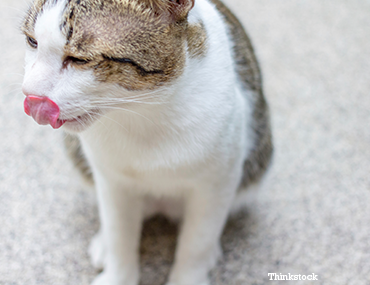Like dogs, cats are naturally curious. But sometimes their curiosity gets the best of them, and this is especially true when cats eat strange things. As connoisseurs of life, many cats don’t hesitate to sample all sorts of objects from toilet paper to thread, clothing, and even rodents and insects. While many of these things are able to pass through the intestinal tract without incident, sometimes a cat’s appetite for life can cause problems. This is definitely true for dogs as well – be sure to read about the dangers of foreign object ingestion to your dog.
The most common problem caused by eating something strange is a foreign body obstruction. A potentially life-threatening condition, foreign body obstruction occurs when one of the many strange objects (foreign bodies) ingested by your cat is unable to make it successfully through the intestinal tract. When the object becomes “stuck,” it can cause a lot of discomfort and be very dangerous.
If you know your cat has ingested something she shouldn't have, call your veterinarian immediately.
Causes and symptoms
When something is ingested by your cat, it usually takes between 10-24 hours to move through the entire digestive tract. Some objects, however, can take much longer – even months! Sometimes, objects are too big to progress through the digestive tract, and when this is the case, they cause an obstruction. If the foreign body has made it to the colon, it’s likely to pass – however, there’s still the possibility that it will be painful, especially if it is sharp or jagged. In cases like this, you might need veterinary assistance. It is important to follow this rule: never pull a foreign object that is protruding from your pet’s rectum! If still lodged inside, this can cause serious damage. Here are some symptoms to watch for if your cat has eaten something strange:
- Vomiting
- Diarrhea
- Abdominal tenderness or pain
- Lack of appetite
- Straining to defecate; constipation
- Lethargy
- Behavioral changes such as biting or hissing when picked up
Thread alert!
Another potentially life-threatening condition can occur if a cat swallows thread, especially if it is attached to a needle. As the cat swallows thread, it can wrap around the tongue and pull against the tongue with each swallow. If that sounds uncomfortable, consider what can happen if a needle is attached to that thread: it may pierce the stomach or intestines multiple times and keep the thread from passing through the digestive tract. Ouch!
 Diagnosis
Diagnosis
If a foreign body blockage is suspected, x-rays will be used to confirm the diagnosis. Often, several x-rays will be needed (using dyes) to locate the object. Additionally, your veterinarian may want to run blood and urine tests to determine whether your cat’s overall health has been negatively impacted by the obstruction and also to rule out other causes of vomiting such as enteritis, pancreatitis, infections, or hormonal diseases like Addison’s disease.
Treatment
If your cat did eat a foreign body, there are a few possible treatment options depending on the condition of your pet.
If your cat has been profusely vomiting, writhing in pain, and generally miserable the first thing your veterinarian will do is provide intravenous fluids and pain control.
In addition, inducing vomiting may allow the cat to rid herself of the object. You should never induce vomiting on your own, without talking to your vet first; under the wrong circumstances, it could injure or even kill your cat. The object also may be removed through endoscopy, in which case a long tube is inserted through the mouth of your cat and is used to pull the object from the stomach. Your veterinarian will make recommendations, and if this is the case, may also suggest hospitalization of your kitty for close observation and follow-up x-rays to track the progress of the item.
If the object has made it into the intestine, your vet will have to remove it through surgery. Time is critical because blockage in the intestine or stomach can cut blood supply to the stomach and intestinal tissue, causing that tissue to become necrotic, or “die.”
Prognosis
Most of the time, especially in uncomplicated cases, prognosis for pets that have gastrointestinal blockage is very good. However, overall prognosis depends on several factors:
- The location of the object
- The duration of obstruction caused by the object
- The size, shape, and characteristics of the object – essentially, it depends on what the object is
- Whether or not the object causes secondary illness
- The overall health of the pet prior to ingestion of the object
Your veterinarian will provide you with a detailed treatment plan and prognosis based on these factors.
Prevention
One way to keep your cat from eating things she shouldn’t is to limit access to tempting items. When it comes to toys, it’s important to provide toys that are the right size and made of material that won’t easily break down into smaller, potentially dangerous pieces.
If you’re not sure, ask your veterinarian – he or she will be your best resource in determining which toys and objects are safe for your cat and can also give you advice on how to prevent your cat from eating strange objects.
